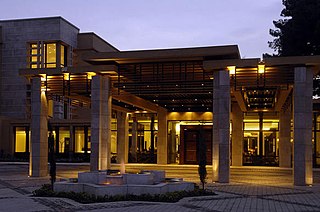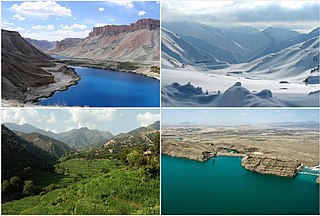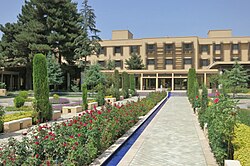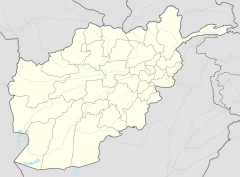
Kabul is the capital city of Afghanistan. Located in the eastern half of the country, it is also a municipality, forming part of the Kabul Province. The city is divided for administration into 22 municipal districts. In 2025 its population is estimated to be 6.74 million people. In contemporary times, Kabul has served as Afghanistan's political, cultural and economical center. Rapid urbanisation has made it the country's primate city and the 76th-largest city in the world.

Prince Karim Al-Husseini, known as the Aga Khan IV since the death of his grandfather in 1957, is the 49th and current imam of Nizari Isma'ilis. He has held the position of Imam and the title of Aga Khan since 11 July 1957 when, at the age of 20, he succeeded his grandfather, Aga Khan III. The Aga Khan claims direct lineal descent from the Islamic prophet Muhammad through Muhammad's cousin and son-in-law, Ali, who is considered an Imam by Nizari Isma'ilis, and Ali's wife Fatima, Muhammad's daughter from his first marriage. Aga Khan IV is also known by the religious title Mawlānā Hazar Imam by his Isma'ili followers.

The Aga Khan Development Network (AKDN) is a network of private, non-denominational development agencies founded by the Aga Khan, with the primary focus of improving the quality of life in different regions of Asia and Africa.

Prince Rahim Aga Khan is the second of the Aga Khan IV’s four children. Based in Geneva, Switzerland, he has been actively involved for many years in the governance of the Aga Khan Development Network (AKDN).
Tourism Promotion Services, doing business as Serena Hotels, is a hotel chain that operates hotels in East Africa, Southern Africa, and South Asia.

Sirajuddin Haqqani is an Afghan warlord and Specially Designated Global Terrorist who is the first deputy leader of Afghanistan and the acting interior minister in the internationally unrecognized post-2021 Taliban regime. He has been a deputy leader of the Taliban since 2015, and was additionally appointed to his ministerial role after the 2021 withdrawal of foreign troops. He has led the Haqqani network, a semi-autonomous paramilitary arm of the Taliban, since inheriting it from his father in 2018, and has primarily had military responsibilities within the Taliban.

Bagh-e Babur, also known as Gardens of Babur, is a historic site in Chelsatun, Kabul, Afghanistan. It is located in the Sher Darwaza hillside of District 5, southwest of Shahr-e Naw, or a short distance south of Kabul Zoo and north of Chihil Sutun. The gardens of Babur has several terraced buildings, a small mosque, and plenty of walking space. Visited by up to one million locals and foreign tourists a year, it is also where the tomb of the first Mughal emperor Babur is located. The park is thought to have been developed around 1504, when Babur gave orders for the construction of an "avenue garden" in Kabul, described in some detail in his memoirs, the Baburnama. It has been re-developed by various Afghan rulers since then.

Aga Khan Fund for Economic Development SA is a Swiss for-profit entity and international development finance institution which invests in countries of East Africa, West Africa, Central Asia, and South Asia. It is based in Geneva, Switzerland.

The 2008 Kabul Serena Hotel attack was an attack on the gym of the Kabul Serena Hotel, in Kabul, Afghanistan on January 14, 2008, for which the Taliban claimed responsibility.
Qozidavlat Qoimdodov is a Tajikistani agrarian and politician. He served as the Deputy Prime Minister of Agriculture in Tajikistan.

Tourism in Afghanistan is regulated by the Ministry of Information and Culture. There are at least 350 tourism companies operating in Afghanistan. Tourism was at its peak before the 1978 Saur Revolution, which was followed by the decades of warfare. Between 2013 and 2016, Afghan embassies issued between 15,000 and 20,000 tourist visas annually. Following Taliban's return to power in August 2021, visitor numbers gradually increased from 691 in 2021 to 2,300 in 2022, reaching 7,000 in 2023.

The Kampala Serena Hotel is a hotel in Kampala, the capital and largest city of Uganda. The hotel is rated 5-stars by the Uganda Tourism Board.

Sayed Mansur Naderi is the incumbent Sayed of Kayan; leader of the Shi'a community of Afghanistan centred in Baghlan Province and also in other parts of Afghanistan. This community although Shia is smaller than the mainstream Twelver Shia community in Afghanistan.

Shia Islam in Afghanistan is practiced by a significant minority of the population. According to a 2021 Pew survey, 7% of Afghans followed Shia Islam, but other estimates have put the number as high as 20%. Afghanistan's Shia are primarily the Twelvers, while a minority are Ismailis.
The following is a timeline of the history of Kabul, Afghanistan.

On 20 March 2014, Taliban militants carried out a mass shooting in the restaurant of the Kabul Serena Hotel, in Kabul, Afghanistan. The shooting, which took place in a hotel popular with foreigners and wealthy Afghans, killed nine civilians, including five foreigners. The attack was a shock to many as it took place in a heavily fortified area of Kabul.

On 13 May 2015, eight gunmen attacked a bus travelling in Safoora Goth, Karachi, Sindh in Pakistan. The shooting left at least 46 people dead. All of the victims were of the Ismaili Shia Muslim minority, suggesting the attack was a targeted killing of sectarian nature.
On 13 May 2015, three gunmen stormed the Park Palace guesthouse in Kabul, Afghanistan. The attack is believed to be part of the Taliban's annual spring offensive against NATO's presence in the country.

Deh Afghanan is a downtown settlement in the center of Kabul, Afghanistan. It forms part of administrative District 2. It was once a small Pashtun village that spread across the Zarnegar Park open space, which was home of the Zarnegar Palace built under Emir Abdur Rahman Khan around the early 1900s. Today Zarnegar Park is the largest urban park in downtown Kabul and contains a mausoleum of Abdur Rahman. Deh Afghanan is one of the city's main commercial districts and is home to the municipality headquarters, several ministry buildings, banks, the Serena Hotel, and the Arg. In 2009 the Abdul Rahman Mosque was completed and opened in the area. It also contains a mix of historic housing next to modern business buildings.

Prince Amyn Muhammad Aga Khan is the brother of Aga Khan IV, Imam of the Nizari Isma'ili sect of Shia Islam. He is the son of Prince Aly Khan and Princess Tajuddawlah Aga Khan.



















